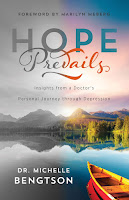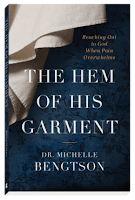The Interview
Dr. B, you haven’t always been a published author. Before you began publishing books to encourage others on their painful journeys, what did you do?
I always knew I wanted to be a writer. I began entering writing contests in my pre-teen years. I was encouraged to write because I enjoyed word-smithing but to also pursue a career in which I could make a living. So I became a board-certified clinical neuropsychologist, first in the hospital setting and then in private practice, where I evaluated, diagnosed, and treated patients with any kind of suspected brain inefficiency including but not limited to ADHD, learning disabilities, developmental delays, stroke, traumatic brain injury, and dementia.
You minister to people daily through your website, books, social media posts, and podcast. Do you have a mission statement?
I’m grateful for each day God has given me, and it’s my desire to encourage others with the encouragement He has given me. My mission statement is the following: I seek to restore hope, renew faith, and encourage others to live in their God-given identity by teaching them how to renew their mind one transformed thought at a time.
Your first traditionally published book was about overcoming depression. Why did you decide to write about depression?
I didn’t choose to write a book about depression…the topic and the publishing industry basically chose me. I had been planning to write a book to help guide parents whose children were diagnosed as being on the autism spectrum. But I was speaking at an event where literary agents and publishing house acquisition editors were in attendance, and at the time I was sharing how depression would be our greatest epidemic worldwide. After I spoke, agents and editors kept approaching me telling me that when I finished writing my book on depression, to send it to them because they wanted to see it. I went home, began writing the proposal, and within two weeks, I became deathly ill. The further my health declined, the more depression got a foothold to the point that I cried out to God and told him that if that was going to be my life, I wasn’t sure I wanted to continue living. But our God is such a good, redemptive God, and because I endured a time of severe clinical depression, Hope Prevails: Insights from a Doctor’s Personal Journey Through Depression became a much more empathic, compassionate book concerned about those who also walked through the valley of depression.
How did you decide what to write next, after Hope Prevails?
Again, I didn’t really decide. My readers decided for me. After reading Hope Prevails, many readers contacted me and wondered when I was going to go even deeper into God’s Word and write a Bible Study. I didn’t consider myself a Bible teacher, but with God’s help, I went on to write and publish the Hope Prevails Bible Study. Then readers began asking when I was going to write a book on anxiety. So my next project became Breaking Anxiety’s Grip: How to Reclaim the Peace God Promises. When I was so ill and on medically prescribed bed rest, and wrestling with depression’s darkness, I began a daily practice of writing an encouragement that always began with, “Today is going to be a good day because …” And I followed that statement with one of God’s promises. I began what has become a daily ministry over the last six years of writing a “Good Day” post on social media, and readers resonated with the message, so the publisher asked me to write all new content for the book Today is Going to be a Good Day: 90 Promises from God to Start Your Day Off Right” to help us choose a mindset based on God’s Word.
Your books have all seemed to have been written after you came out of a struggle, sharing what you learned on that journey. How is that different from your most recent release?
That’s very true. Hope Prevails, the Hope Prevails Bible Study, and Today is Going to be a Good Day were written after I came through the valley of depression. Breaking Anxiety’s Grip was written after I came out of anxiety. My husband and I are no strangers to pain: we’ve endured multiple cancer diagnoses between the two of us, have lost many friends and family to cancer, have gone through a miscarriage and job loss, have felt the sting of relationship issues, and I struggle through severe daily chronic pain. My publisher asked me to write my newest book, The Hem of His Garment: Reaching Out to God When Pain Overwhelms. This book is different from any of my previous books because this book was written in the crucible of pain rather than through the rearview mirror of pain.
Who did you write The Hem of His Garment for? And what do you hope readers take away from reading it?
The Hem of His Garment was written for those enduring physical, emotional, relational, financial, and spiritual pain, grief, or loss, and need a hand to hold, hope to cling to, and a voice in the darkness to encourage them to continue putting one foot in front of the other. The Hem of His Garment focuses on the stories of the woman with the issue of blood, and to a lesser extent, Job because they both endured every one of the different types of pain mentioned above. The world is inundated with people walking their own painful journey. The question we try to answer for the reader is, “How do we hold onto our faith, like the woman with the issue of blood or like Job, when we know God can heal, but he hasn’t yet?” and “What lessons or gifts does God offer us amid our painful circumstances?”
Why did you focus on the woman with the issue of blood in The Hem of His Garment?
Having gone through physical, emotional, relational, financial, and spiritual pain, I could relate to this woman because she also experienced each of those kinds of pain. In addition to her physical pain, she likely also endured emotional pain from the years of rejection and ridicule such a disorder promoted in those times. She likely experienced relational pain resulting from others choosing to not associate with an unclean woman, likely leaving her single or divorced. We know she suffered financial pain because Scripture tells us she spent all her money on doctors but continued to get worse. She may have experienced spiritual pain as a byproduct of knowing God could heal but for whatever reason hadn’t. And she probably experienced grief not just from lost relationships and lost opportunity to provide for herself financially, but also from loss of hopes and dreams for her future.
Speaking of the woman with the issue of blood, what do you think is one of the key takeaways from her story?
When Jesus went to people, we saw them get the healing desired (the blind man could see again, the lame man could walk again, Lazarus could live again). But when the woman with the issue of blood went to Jesus, she received much more than she probably imagined. This woman held on to her faith over twelve years of suffering, knowing that if she could just touch the hem of his garment, she would be healed. In that moment Jesus said to her, “Daughter, your faith has healed you.” (Luke 8:47-48 NIV) Jesus not only healed her physically, but he saw her, he validated her and her worth, he offered her a future, and he gave her a testimony, none of which would she have experienced in the absence of pain and suffering. Perhaps in our longing for healing of our pain, God is beckoning us to exercise our faith, to come to him and touch the hem of his garment. Perhaps he has something more waiting for us.
What do you hope others take from reading The Hem of His Garment?
It’s my prayer that readers realize they aren’t alone in their pain and suffering, they have a hand to hold, and a fellow sojourner to walk with them through their pain. I want them to learn practical steps they can take to continue reaching out for the hem of Jesus’s garment. Their pain may not change but their perspective of it may.
Are you working on another project?
If you are struggling with physical, emotional, relational, financial, or spiritual
pain, grief, or loss, and don’t know what to do, let me encourage you to pick up a copy of my book The Hem of His Garment: Reaching Out to God When Pain Overwhelms for additional insight on how to maintain your faith as you walk through this painful time.
I blog regularly on my Website: https://www.DrMichelleBengtson.com and you can find me on these social media channels:
You can listen to Your Hope-Filled Perspective on Apple Podcast as well as on her website here: https://bit.ly/3ef2fvs
Make sure you go check out all of Dr. B's books here: Amazon





If you have questions, or comments for Dr. Michelle, please leave your comments below. I know she would love to hear from you.
Dr. Michelle Bengtson is a hope concierge! Whether as a board-certified clinical neuropsychologist, host of the award-winning podcast Your Hope-Filled Perspective, or the author of several award-winning books including Hope Prevails and Breaking Anxiety’s Grip, her passion is to share hope and encouragement with others. Her newest release is The Hem of His Garment: Reaching Out to God When Pain Overwhelms. She loves all things teal, spending time with friends and family, taking long walks, or sitting by quiet shores, and it’s a bonus when any of those are accompanied by sea salt caramel chocolate! You can find her and her hope-filled resources at DrMichelleB.com





No comments:
Post a Comment
Join the discussion! I'd love to hear your thoughts!
blessings,
Gay